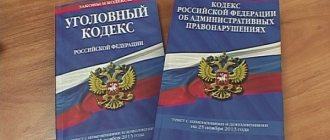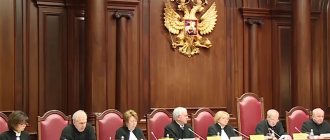1. An inquiry officer or investigator has the right to separate another criminal case from a criminal case into separate proceedings in relation to: 1) individual suspects or accused in criminal cases of crimes committed in complicity, in the cases specified in paragraphs 1-4 of part one of Article 208 of this Code ; 2) a minor suspect or accused brought to criminal liability along with adult accused; 3) other persons suspected or accused of committing a crime not related to the acts charged in the criminal case under investigation, when this becomes known during the preliminary investigation; 4) a suspect or accused with whom the prosecutor has entered into a pre-trial cooperation agreement. In the event of a threat to the safety of the suspect or accused, the materials of the criminal case identifying his identity are withdrawn from the criminal case initiated and added to the criminal case against the suspect or accused, separated into separate proceedings; 5) individual suspects in respect of whom the preliminary investigation is carried out in the manner established by Chapter 32.1 of this Code, if in relation to other suspects or accused the preliminary investigation is carried out in accordance with the general procedure.
2. Separation of a criminal case into a separate proceeding to complete the preliminary investigation is permitted if this does not affect the comprehensiveness and objectivity of the preliminary investigation and resolution of the criminal case, in cases where this is caused by the large volume of the criminal case or the multiplicity of its episodes.
3. The separation of a criminal case is carried out on the basis of a decision of the investigator or inquiry officer. If a criminal case is separated into separate proceedings for the purpose of conducting a preliminary investigation of a new crime or against a new person, then the resolution must contain a decision to initiate a criminal case in the manner prescribed by Article 146 of this Code.
4. A criminal case separated into separate proceedings must contain originals or copies of procedural documents relevant to this criminal case certified by the investigator or inquiry officer.
5. Materials from a criminal case separated into separate proceedings are admitted as evidence in this criminal case.
6. The period of preliminary investigation in a criminal case separated into separate proceedings is calculated from the date of the relevant decision, when a criminal case is separated for a new crime or against a new person. In other cases, the period is calculated from the moment of initiation of the criminal case from which it was separated into separate proceedings.
In what cases can a criminal case be separated into separate proceedings?
Can the victim petition for the materials of the criminal case to be separated into separate proceedings?
Lawyer Antonov A.P.
Good afternoon The answer to your question depends on the stage of the criminal proceedings. According to Art. 155 of the Criminal Procedure Code, if during the preliminary investigation it becomes known that other persons have committed a crime unrelated to the crime under investigation, the investigator or interrogator makes a decision to separate materials containing information about a new crime from the criminal case and send them for acceptance decisions in accordance with Articles 144 and 145 of the Criminal Procedure Code: the investigator - to the head of the investigative body, and the investigator - to the head of the inquiry body. According to Part 3 of Article 154 of the Criminal Procedure Code, the separation of a criminal case is carried out on the basis of a decision of the investigator or inquiry officer. If a criminal case has been separated into separate proceedings for the purpose of conducting a preliminary investigation of a new crime or against a new person, then the resolution must contain a decision to initiate a criminal case in the manner prescribed by Article 146 of the Criminal Procedure Code. At the judicial stage, the issue of separating a criminal case is decided by the court. According to Art. 239.1 of the Criminal Procedure Code, in the case of a received criminal case, the court, if there are grounds provided for by the Criminal Procedure Code, has the right to decide to separate the criminal case into separate proceedings and send it to jurisdiction in accordance with Article 31 of the Criminal Procedure Code, if separate consideration by the courts criminal cases will not affect the comprehensiveness and objectivity of their resolution. The separation of a criminal case is allowed in relation to: 1) individual suspects or accused in criminal cases of crimes committed in complicity, in the cases specified in paragraphs 1 - 4 of part one of Article 208 of the Criminal Procedure Code; 2) a minor suspect or accused brought to criminal liability together with adult accused; 3) other persons suspected or accused of committing a crime not related to the acts charged in the criminal case under investigation, when this becomes known during the preliminary investigation; 4) a suspect or accused with whom the prosecutor has entered into a pre-trial cooperation agreement. In the event of a threat to the safety of the suspect or accused, the materials of the criminal case identifying his identity are withdrawn from the criminal case initiated and added to the criminal case against the suspect or accused, separated into separate proceedings; 5) individual suspects in respect of whom the preliminary investigation is carried out in the manner established by Chapter 32.1 of the Criminal Procedure Code, if in relation to other suspects or accused the preliminary investigation is carried out in accordance with the general procedure. The right to submit applications, complaints and petitions is one of the basic rights of participants in criminal proceedings, including the victim. This right is enshrined in clause 5, part 2, article 42 of the Criminal Procedure Code.
Sincerely, lawyer Anatoly Antonov.
Still have questions for your lawyer? Ask them right now here, or call (24/7), or come to our office for a consultation (by appointment)!
Commentary on Article 155 of the Code of Criminal Procedure of the Russian Federation
1. The grounds for separating materials must be distinguished from the grounds for separating a case (Article 154 of the Code of Criminal Procedure). Material is allocated to a separate proceeding if three conditions are simultaneously met: a) “other persons” have either not yet been identified or have not yet been brought in as suspects or accused. If separation is required in relation to a suspect or accused, then it is necessary to separate the case under clause 3 of part 1 of Art. 154; b) when, before singling out, it is obvious that there is no connection between the “main” crime and the fact being singled out. If this connection is not obvious, then a single case is investigated. If a lack of communication is established after an investigation, a case may be opened under clause 3 of part 1 of Art. 154; c) there is insufficient information about the fact being highlighted that indicates the signs of a crime (for example, the investigator assumes that a crime has been committed under “someone else’s” jurisdiction). If at the time of separation there is sufficient data on the signs of a crime - grounds for initiating a case, then a new case should be opened and allocated under Part 3 of Art. 154.
2. For evidence, see com. to Art. Art. 74 - 75.
Separation through court
Typically, a judge does not cancel official decisions previously received by investigative and inquiry authorities. It is impossible to cancel a decision even with such factors as the presumption of validity and evidence of the decisions made and those not appealed.
If you need to combine or separate cases at the trial stage, you will have to return them to the prosecutor's office. This is required to make a new decision and to conduct further investigation. An official decision on merger or separation will be made by the court in three situations:
- One or two defendants have filed a motion to have the case heard by a jury. No such will was received from other participants.
- One defendant developed a mental disorder during the trial. It may also be another medical condition that prevents the trial.
- One of the participants admitted guilt and made it clear that the proceedings could be carried out according to a simplified procedure.
Such decisions are subject to appeal quite rarely. The reason is that the legal and factual grounds are obvious to all participants in the process.
What does judicial practice show under this article?
Investigators quite often separate the case materials into separate proceedings, because this allows them to solve part of a complex crime without unreasonably delaying the deadlines and keeping the accused in custody.
An example of a situation would be the case of the murder of a pensioner by two grandchildren. During the judicial investigation, the guilt of one of the grandchildren was fully established, that is, there was all the evidence indicating his involvement in the case (fingerprints and the murder weapon were found, and the grandson himself confessed to the crime).
No clear evidence was found regarding the other grandson, and the subject himself absconded from investigation. The investigator decided to separate the materials regarding the well-known accused into separate proceedings, and submitted it to the court for consideration. In this case, there was no need to initiate new proceedings, since the same subject was involved in the case initially.
If one person had been accused of murder and had escaped the investigation, but during the investigation it became known that the grandson of the deceased was also involved in the murder (strong evidence was found against him), then a criminal case would be opened against him and he would be singled out. it is in a separate production.
What decisions are most often made under Article 155 of the Code of Criminal Procedure?
It will be interesting to know that excessive allocation is not a significant violation of the law, while the absence of a allocated case, if there are grounds, will lead to the inadmissibility of all evidence obtained during the investigation, and the recognition of all decisions made as illegal.
Failure to separate a case into separate proceedings if there are grounds can lead to disastrous consequences for both victims and the accused, because he will have to wait for a long time for trial. The consequences may also affect the investigator or interrogator himself, who made procedural errors in conducting the investigation. That is why, in most multi-episode crimes, investigators, if possible, separate the case materials into separate proceedings. Sometimes investigators even make allocations to “insure” the interests of the victim and the accused.
What circumstances most often make it difficult to isolate a case?
The separation of a case into a new proceeding makes it possible to achieve all the main goals of the criminal process, but sometimes it is not so easy to carry out this procedural procedure. The most difficulties arise when a minor is involved in the case. In fact, it is impossible to consider the guilt of an adult and an unformed personality in the same proceeding as equals, this is also confirmed by the Code of Criminal Procedure of the Russian Federation. At the same time, the question arises of the advisability of separating the case of a minor into separate proceedings, because he is not subject to criminal liability, and his punishment will be educational work.
It is this conflict that often torments investigators and interrogators, because if you make a mistake at the stage of preliminary investigation in the formation of procedural documents, you can take the investigation down the wrong path, and then all the work done will go down the drain. Based on this, competent officials separate cases involving minors only for serious and especially serious crimes into separate proceedings. But in any case, the decision of the prosecutor or investigator can be appealed by the participants in the process in court.
Procedure for separating a case
The division of the process is carried out in such a way as to completely eliminate any possible threat to impartiality and comprehensive consideration. From the point of view of the criminal code, this measure is considered forced.
The reason is that there is a negative impact on the comprehensiveness of the investigation. These parameters remain low, despite the fact that the circumstances of the disconnected factors are in a special feedback relationship. They can be cited as evidence in two processes.
Connecting cases
The theory of modern criminal law regards the consolidation of proceedings into one to expand the overall scope of proceedings. In this case, the principle of multiplicity of actions and multi-subjectivity is taken into account.
Consolidation of proceedings always has an important procedural and substantive aspect at its core!
All possible material components are indicated in the disposition of Art. 153 Code of Criminal Procedure. Here are the grounds for combining cases into one special proceeding:
- The presence of previously opened proceedings and proceedings in relation to one specific entity. Proof of authorship is important.
- Committing several violations at once by one person. In such a case, the proceedings are combined into a single case. The time and organizations that conducted the investigations do not matter here. The merger is carried out according to the principle of the plurality of actions carried out.
- Complicity, like concealment, which was not promised in advance.
- The commission of crimes of equal nature and gravity by a group of persons. In this case, not several cases are being investigated against one violator, but one case committed by several persons. In such a case, the connection is made according to the principle of a circle of persons.
The main material aspect is objectively prescribed in a special way in non-normative acts drawn up by the prosecutor or the head of the investigative case. Employees prepare documents. It is these papers that are considered a procedural aspect in the standard consolidation of cases.
When connecting, the duration of the investigation is taken into account. The duration of the investigation matters. The countdown begins on the date of initiation of the first case from the mass of the combined ones.
The concept of highlighting
Isolation of a criminal case - a mirror technique from the position of connection
Its goal is to concentrate the attention of law enforcement officials on a specific act or subject in order to comply with the constitutional principle of justice, while maintaining the specified criteria of impartiality and comprehensiveness.
Code of Criminal Procedure of the Russian Federation in Art. 154 sets the framework and conditions that create the prerequisites for isolating a criminal case, provides a description of the reasons for issuing such a procedural document.
Legal theorists call the main condition the absence of points of contact between the acts under investigation and the subjects of the accusation. In other words, we can talk about the existence of grounds for separation when the purposeful principles of connection are not identified during the investigation.
Like union, disunion requires two grounds:
- material (an exhaustive list of material aspects of this action is contained in Article 154 of the Code of Criminal Procedure of the Russian Federation);
- procedural (legal consolidation of the material aspect in a document issued by an official).
When a separate criminal case concerns a new person or act, simultaneously with the decision on the division of proceedings, a criminal case is initiated in accordance with Art. 146 Code of Criminal Procedure. In cases with new defendants or episodes, the total duration of the investigation is calculated from the moment the decision to separate the case is made.





